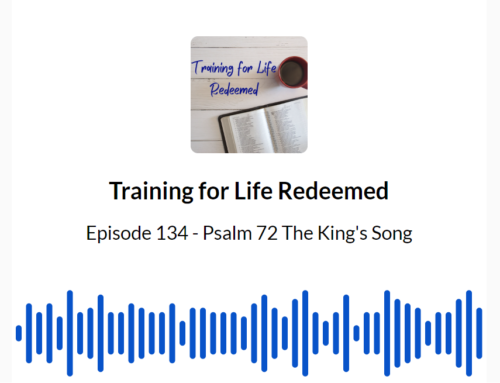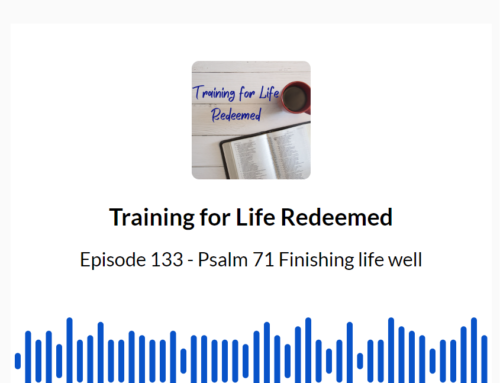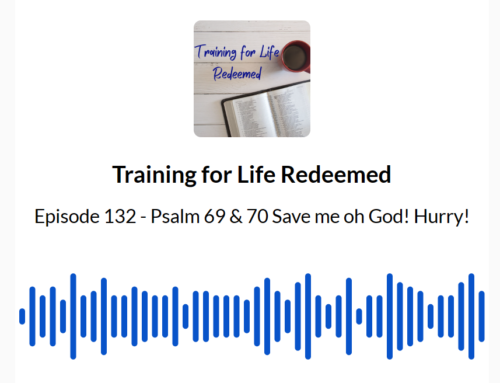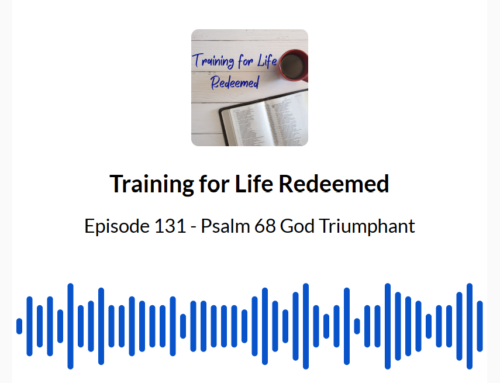Eliphaz is the kind and gentle accuser who thinks that one can be saved by doing better. Job is clinging to the words of the Holy One, who said he is already right with God.
Grab your notes for this episode by completing the form
and we will send you the link to all our notes.
Transcript
Dan: (00:00)
Hi, everyone and welcome to training for life redeemed. I’m your host, Dan. And I’m joined as always by my father, David Jackson. Today, we are looking at Job chapters four to seven, where we have Eliphaz come in and start to talk to Job and Job responds to him. And Dad there’s actually three friends who come and meet Job on the ash heap. Who are they?
David: (00:21)
Uh, yes. So you’ve got it. You’ve got to picture Job is, a herdsman. He owns this huge herd business with tens of thousands of animals. He’s the greatest man in the east, but he’s not the only man. So you’re living in a pastoral community, of people who own herds and flocks and whatnot. He’s one of several peers and these are, virtually clan chiefs. men, I would, I reckon Job, must’ve been about 70. And so here I, his equals, if you like, the other great pastoralists of the area and they have travelled. So if you know anything about pastoral, you know, runs, these people live at some distance away from each other, like the sheep stations outback. So, you know, all the local guys are gonna come in and say, oh, this terrible thing has happened to our neighbor.
David: (01:22)
Let’s go over a hundred K, 200 K and our neighbor and comfort him. So they’ve travelled a great distance and they’ve arranged to meet up somewhere. And then together they come and they find Job sitting on this pile of broken pottery. And you know, the potters ash heap with all these reject pots. And he’s there slicing these boils and looking miserable and they don’t even recognize him. So they plop themselves down. Now, there is a wonderful little thing in the ancient near east. If you’re visiting somebody sick, you wait for them to speak. You don’t barge into the hospital room and say, Hey, Fred, how you doing Fred’s sitting there in agony. You just come in and take a seat and you wait for him to talk to you. And they waited seven days. Uh, and Job did his, you know, chapter three, chapter four,scream, and now they have permission to speak.
Dan: (02:24)
Yeah. So Eliphaz is the first one to speak to Job. He sounds like kind of a nice guy seems generally polite, but Job gets more and more upset by what Eliphaz has to say.
David: (02:38)
He sure does. Eliphaz, Eliphaz comes with good intentions. Like he wants to comfort Job. That’s going to be a big word throughout the whole book. In fact, all three friends want to comfort him, but the comfort they bring is making it worse. And so Eliphaz being the oldest, it looks like he’s the senior guy out of the three. He speaks first. And when he comes in, he start, he goes very gentle. And would it be okay if I have a word with you? Is it going to upset you? Is it going to stress you out? If we have a conversation here, very polite, very caring. The next thing he says is Oh Job. You’ve been a great fellow. Look at all the godly pious in that life. You’ve lived all the wonderful things you’ve done. So he does all the, the sugar on top.
David: (03:32)
And then at the end of it, basically, he comes down to arguing that there, you could never be blameless with God you know, how can, how can a, can anybody stand there and say you are righteous or you are blameless. And that immediately we’re at the heart of the gospel. So one of my favourite little games to play with the kids at school was when we’re opening the Bible to say to my class, you can all go home and tell your parents that your Bible teacher is perfect. And you just wait for the reaction. All right. And that’s what, that’s what Eliphaz is reacting to. Job was saying he’s blameless. And yet God has clobbered him with all this suffering. He can’t possibly be blameless. Nobody can be blameless… We’re all sinners, is the phrase, isn’t it? You know, we’re all born sinners, but some of us aren’t sinners anymore because Jesus died in my place.
David: (04:40)
For Job, That’s a promise way off in the future. And he believes it. And so God has spoken. You are blameless. You are justified, you are righteous. And Job was saying, you know, that, that too, I am an Eliphaz the same, but that nobody can be blameless. And that doesn’t help Job because Eliphaz is saying, you’ve done something wrong to deserve this. So on top of losing his children and everything he owns, and having his wife throw a tantrum and walk off now, his friends are accusing him the way the prosecutor in heaven. Was accusing him. So suddenly Satan may be out of the picture, but these three friends are going to take over from him. And that that’s, that’s really hurtful.
Dan: (05:31)
Yeah. You don’t really want to be told that it’s all your fault when all that stuff’s happened to you. For sure. Yeah. How can Job be sure that Eliphaz is wrong, how can we be so certain that he is blameless because he’s not in the courtroom? Like he hasn’t heard God say that about him. And yet he, he seems to think this, like he says in chapter six, verse 29, that he’s righteous. But at the same, time he gets a bit confused maybe by chapter seven, verses 20 to 21, where he, starts to ask God to pardon his sin. I mean, I think for us, when I look at it from this side of the cross, you know, I know that our sin has been pardoned because, you know, it’s given to us in God’s word, Jesus has said, so I have that. Whereas Job doesn’t have that. So like he might’ve heard the promises to Abraham maybe, but what’s, what’s he going off to be able to say that he’s blameless and yet also be asking for his sin to be pardoned.
David: (06:29)
Job’s six, 10. is a puzzling verse. Cause it, it, it makes the statement we need to hear, but we don’t know how this works. He says it is my consolation. I rejoice with unsparing pain in all of my suffering that I, uh, I have not denied the words of the holy one. Now, as far as we can tell, Job has no Bible. So what words of the holy one is he not denying? How does he know that God has declared him blameless? He wasn’t in heaven listening to the debate, but he knows it. So my answer to that question is he’s the descendant of Abraham’s nephew, Abraham God said, to Abraham, he credited righteousness to Abraham’s account? Because he put his faith in Yahweh. Abraham believed God. And he credited to him as righteousness. So salvation by faith is right there with Abraham.
David: (07:45)
I, the same thing was true of Noah. So from from Genesis three, right down to these people, there’s an awareness that God has promised to save us. And if you put your faith in that promise, God declares you blameless and innocent, he will take away your sin. And that’s what, that’s, what Job is hanging onto it. Now, I don’t know where he heard the words of the holy one, but the, this is the words of the holy one he’s hanging on to. and, and here’s the trouble. If I let go of that, if I, if I don’t believe that for a second, I have lost salvation itself. I’ve lost, being forgiven. I’m back to trying to earn it from my good works. So the minute Job accepts that he is not blameless. He has accepted salvation by works. If he does that, the prosecutors charge is true. Yep. He’s doing good. Works to try and get the stuff from God, but he’s not. He’s saying I’ll take whatever God gives. He promised to save me. If he wants to do what he likes with me, that’s fine. Because he has made a promise to me. Now, the problem that Job has is he doesn’t know that there’s life after death.
David: (09:11)
So that promise only as far as he can see in chapter three, he can only say that that promise has to do with me. Now, he’s going to have to learn through this process and we’re going to learn with him that there is life after death, and that gives meaning to life. So he’s going to go on and say, look, I don’t understand. Yes, you’ve got the right to do all of this, but you said, I’m forgiven. You said I’m blameless. It doesn’t look like that. It looks like you’re punishing me. So he asks over in chapter seven, have I sinned, am I wrong?
David: (09:54)
You know, do you, you did say this, am I wrong? and then he goes on to say, why, why don’t you pardon my transgression? it, it looks like you haven’t, you said I’m innocent. Have I sinned and if I sinned, you said you forgive all this stuff. What’s going on. That’s what’s happening at the end of chapter seven, but clearly Job isn’t blameless because he never seen, he makes no secret of the fact that he has sinned. But the wonderful thing is he has a word from God that says you trusted me and my promise, therefore, your I’ll take care of the sin problem. It’s gone. And there’s your gospel.
Dan: (10:42)
Well, that, that brings us to the end of , our first conversation with Eliphaz tribe actually has two more friends to go. So make sure that we are talking about next week. So those of you who are listening, if you want to grab the study notes for this episode, head over to trainingforliferedeemed.com/50. If you enjoyed this episode, we would love for you to leave a review on apple podcast. We’d love to hear from you there and to see what you’re thinking of the show. And of course, make sure you subscribe to come back next week. When we start to listen to what the other friends have to say, to Job and how it impacts him and how he responds.



